Director/producer Tamra Davis’ documentary Jean Michel Basquiat: The Radiant Child (2010) gives an intimate portrait of how Basquiat went from being an unknown in the art world, scrawling his trademark SAMO (Same Old Shit) graffiti, to becoming one of the most recognizable faces in New York City and one of the world’s most prolific artists. But Davis alludes to the perils of such overnight celebrity, as Basquiat reached international stardom at age 23 and overdosed on heroin at age 27.
Jean Michel’s roots fall far from fame and fortune. After he left his middle class Brooklyn home at age 17, he slept in Washington Square Park, sought money on the floor at clubs, panhandled, and ate Cheese Doodles because they were only 15 cents. He sat in the back of the bar and observed for weeks until he could afford to buy a drink. But even after he sold his first painting for 200 dollars and later achieved millionaire status, he still didn’t have a bank account and instead kept thousands of dollars hidden under seat cushions and between the pages of books.
Yet neither Jean Michel’s rising celebrity nor his paintings were the favorite subject of his interviewers. Many journalists turned focus away from Jean Michel’s remarkable artistic talent, to rather discuss his skin color. Does he like to be called The Black Picasso? He replied:
“Not so much. It’s flattering, but I think it is also demeaning.”
One interviewer described his work as
Some sort of… “primal expressionism.”
Basquiat questioned
“Like an ape? A primate?”
The interviewer stammered
“Well, I don’t know, is that..”
And Basquiat responded
“You said it.”
Basquiat told Davis: “They have this image of me as a wild monkey-man.” Sort of the image portrayed in his barefoot-in-Armani 1985 New York Times Magazine cover (above).
One incident that struck particularly close to Basquiat was when Michael Stewart, a young 25-year-old graffiti artist, was beaten to death by five white police officers. On the night of the attack, Stewart was arrested for scrawling graffiti in a Brooklyn subway. It happened at 3 AM. 30 minutes after his arrest, Stewart was in a deep coma in Bellevue Hospital. 13 days later he was dead.
Like Basquiat, Stewart was black and wore dreadlocks.
Basquiat’s former girlfriend Suzanne Mallouk said:
“It really affected Jean Michel. He thought it could have been him. And it could have been.”
Jean Michel painted “Defacement (The Beating of Michael Stewart)” (below) following this incident:
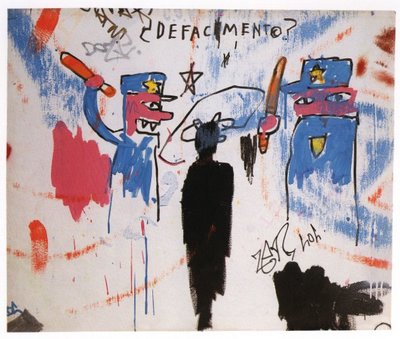
Davis skillfully intersperses Basquiat’s artwork with scenes of New York and LA; interviews with friends, art dealers, and graffiti artists; footage of Basquiat when he was 25; and his encounters with celebrity figures. Yet more poignant than his friendship with Andy Warhol or his love affair with Madonna was Jean Michel’s passion for his craft.
He was inspired by everything: music, art, history, literature. He painted quickly, intensely, and vividly. He yearned to express his soul visually and practiced art for art’s sake, seemingly without much regard for monetary gain.
Fittingly, Davis leaves us with parting words from another venerated artist – a variation of Langston Hughes’ poem Genius Child.
This is a song for the genius child.
Sing it softly, for the song is wild.
Sing it softly as ever you can —
Let the song get out of hand.Nobody loves a genius child.
Can you love an eagle,
Tame or wild?Wild or tame,
Can you love a monster
Of frightening name?Nobody loves a genius child
Free him – and let his soul run wild.
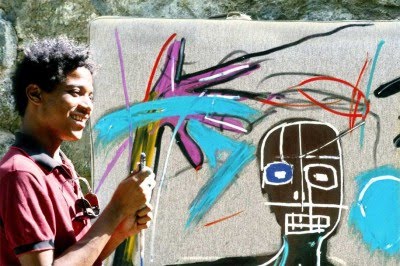
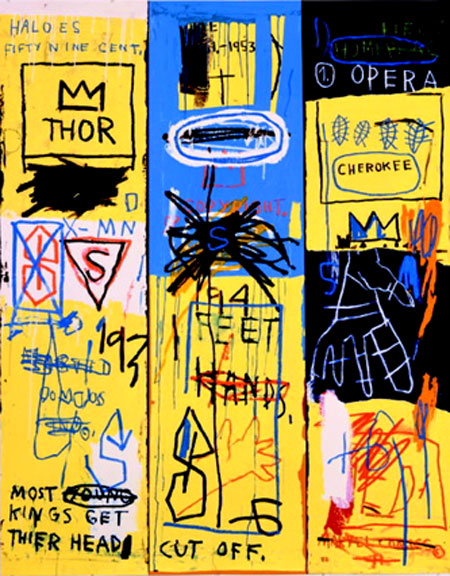
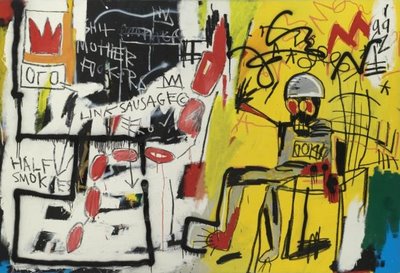
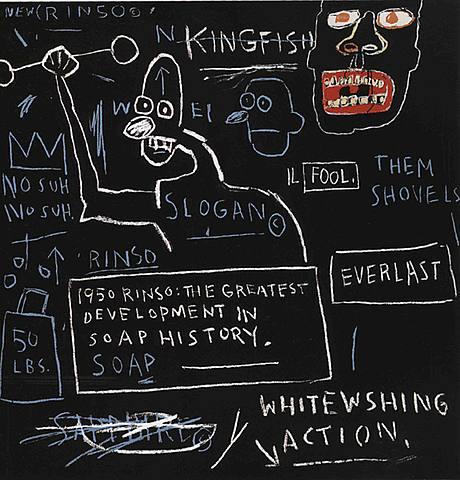
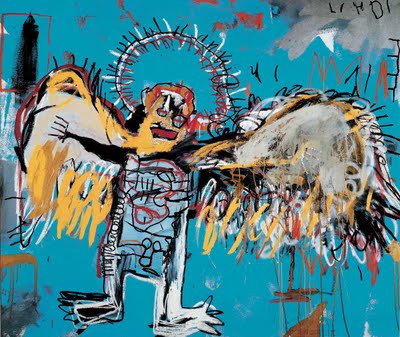










I saw this documentary +Lark Fleming , and I must say it was as interesting as you had promised. His story in LA was humbling.
LA is not as easy as it looks, but I still love it. I loved the part Ann quoted “Like an ape? A primate?”
He tried to win the game, but he forgot he was playing a game and once he remembered it was too late. It was a fascinating documentary.
Very fascinating thanx for pointing us to it! What I couldn’t seem to understand was why he so much wanted to get his art into those galleries that refused him? Why he so much wanted to win the whole game? You think greed set in? Maybe not money-wise, but an obsession with fame or seeking belonging among the very same people who call you a primate?
If you’re middle class American success is viewed as being accepted by the elite. I think he has a lot more money than he let on and I think he himself felt he was above the street art scene. He had to play that role to get in the art door, but that’s not who he was.
So he got in as a street artist, but he wasn’t a street artist but owing to racism that’s the only way who could get into the inner circle during that time period. Had he come at them like he was some middle class black person that would have been boring to them and also it would have meant he was competition, the art world is highly competitive. He was smart he walked in there like he was from the inner city and didn’t know anything and caught them off guard. He played the game, but then he wanted to flip the script and be himself, but it was too late, he’d already sold himself as a street artist and a pet.
He forgot the the most important part of the game, always remember your role (you can move from your role, but know who you are in the play and don’t forget, getting out of character in the middle of a play will get you fired, but forgetting you’re in a play can get you committed) and don’t take it personal. Had he just been patient he could have crossed over, the 90s were coming…he just was impatient and cocky.
I agree he was cocky… I guess he forgot he only had one foot in the door, lol.
The game analogy is an interesting way of looking at it. It’s true that he got out of character in the game. But why do people need that kind of acceptance? Is it enough to be one of the world’s top artists or will you not rest until your work is included in a particular gallery? In the film world, can one be satisfied with making a great film without having ever won an Oscar?
Ego is a powerful thing Ann, if we could all get rid of our egos we could accomplish a lot.
To me a person’s ego is like a person’s sex drive, some people really need it, some people don’t, but it’s not something I think you can control. I think it’s genetic. Of course you can control it, but the urge of wanting recognition is something some people truly have to fight.
It seems especially with minority groups, they feel this ‘sex drive’ (I like the way you put it) for the majority acceptance. It’s as if it’s the only way you can do stuff, especially art.
That’s what I seem to appreciate about Tyler Perry. So for example with black people in America, they’re capable of starting their own stuff, if only people like Soulja Boy can invest their $55 million in people rather than in a jet – notwithstanding the competition and heavy money competition that can bring from the main studios. But if TP can do it, Spike Lee coulda done it, Oprah can do it, even Jay-Z can do it if he had a little bit of control over dishing out $250,000 on drinks in a bar. The ‘sex drive’ is gotten outta control. Really!
Jean Michel had so much money at some point. Millions. I wonder why he couldn’t have his own Gallery built for Exhibition? He was well-known then? Why did he still want ‘white’ recognition? With some help from an entrusted entrepreneur, if he himself didn’t wonna do the work, he could have brought the other street people’s work he liked to his Gallery and go from there. Then he wouldn’t have been trying to have an orgasm over white elite recognition. No?
So true about Tyler Perry, he’s not thinking about the “mainstream” if they give him money, cool, if not he doesn’t care.
So true Ben, I do not know why so many people who have money, who are talented, go down this “please love me” road when there are people who already love them. I do not get it, but yet I do get it.
I am trying to start my own book publishing company, business (I’m a horrible business person so maybe I should call it an addiction) but you know in general the only people I can get to work with me are older white guys, everyone else in general (most artists, writers are middle class or aspire to be) don’t want to work with you unless you’ve gotten the stamp of ok from white people (specifically white guys)….I don’t know why this is…
I guess they feel that I would limit them or limit their potential, I don’t mean just me, but just people who are people of color in America, if they worked with a poc business it would limit their opportunities who aren’t people of color. I’m just thinking aloud, I don’t know what it is exactly…
By the way +Ben Dàité Lawer awesome use of my sex metaphor.
Lol… I like your analogies! Hope you don’t mind me appropriating them for free 🙂
I think that to simplify Basquiat’s desire to show in specific galleries as a craving for white attention is to miss the scope of his pursuits. It is clear that he craved fame, yes, he wanted to be a master in his craft. To him, being a master in his craft meant showing in the galleries that he admired. The art world was clearly controlled by a small demographic and not many minorities were involved in it. He was doing the best he could to achieve the heights of recognition. I think it’s very short-sighted to class his desire as greed or overreaching. Frankly, if he was a white man they would have called this AMBITION. Even though people often simplified him and his work based on his race (reducing his work to being “primal,” always qualifying him by his race i.e. Black Picasso and not just his talent) I believe what he wanted to do was prove himself to these people. To be a word class artist that wasn’t just “the black guy,” but Jean-Michel Basquiat the consummate painter. There is nothing wrong with ambition and it knows neither patience nor restraint sometimes. Clearly the sky was the limit in his mind.
You keep talking about how if jean-Basquiat was white, we’ll call his drive ambition. That’s where u missed the train my friend, cos I believe charity begins at home. If these successful black men in America can’t seem to care about their immediate families, their communities, then who the fuck is gonna care about it? White men? No! I can’t continue to blame white people in America for not reaching out full handed to pull black people from the hole they were thrown into since, there seems to be enough resources in black hands to do it. If they don’t want to then fuck ’em!
Soulja Boi is a child. He clearly wasn’t taught about investing his money and neither are most people that rise abruptly to fame. So to criticize people of color for not using institutions and apparatuses that are often very poorly understood by them is to once again not look at the bigger picture. And your Tyler Perry discussion is resting on the premise that he is producing something uplifting? Or that he is catering to a niche community. While that’s cool for some people, others want their work to be enjoyed by all regardless of race. Tyler Perry IS thinking about the mainstream. He is reproducing a set of stereotypes that he knows people will laugh at and continuing to rake in their money.
Spike Lee encountered immense difficulty in producing his films because he catered to a niche audience. The bulk of wealth resides in the hands of caucasians in this country. You also are probably misinformed about Jay-Z, as he is a shrewd businessman. And you’re coming for him for spending the money he made?! Once again, if he was a white man, no one would be salty about him spending his own money. This sex-drive mess honestly made me physically ill.
Jay Z? You call renting a whole hospital for your daughter’s delivery a wise business savvy act? Come on! You call building a 5 bedrooms house inside your mansion for your 1-day-old daughter, a thinking human? Oh come on!
Again as far as Tyler Perry is concerned, I can’t blame nor applaud him. All I can say is that he seems to be having fun – lots of it. Any country you go to, any community you visit in the world, perhaps, outside the USA, people make fun of themselves, they tease each other, mock one another, stereotype themselves and foreigners. These are all healthy parts of life so long as it’s not carried into excesses of racism, homophobia and for example Hitler’s Genocide!
So I see nothing wrong with Tyler Perry’s stories. The guy is simply hanging out with his folks and making them laugh – what does he care what white people – racists white folk – think? I could care less what those m_therfuckers think!